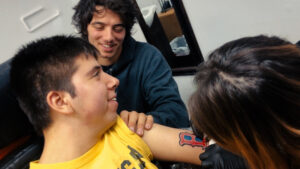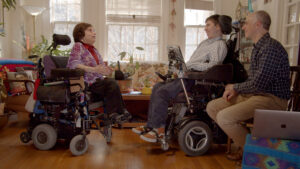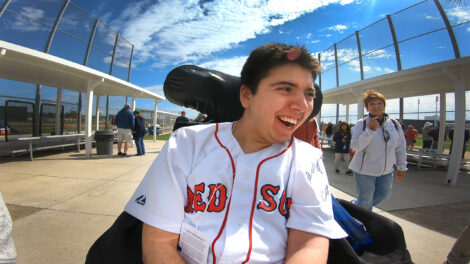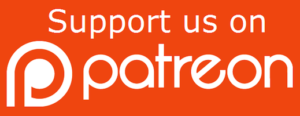Underestimation is an all too common fact of life while disabled. If your disability is physically apparent, your ability to function is questioned or diminished altogether. People will come up to you and tell you things like they would rather die than live in your body. They’ll talk down to you like you’re a toddler, completely dependent on another person to interact on your behalf, and get surprised when you snap back.
If your disability is not physically obvious, it’s a whole other kind of questioning. You look fine, so how bad could it be really? You were able to do this yesterday, so why not today? Either way you slice it, the interpretation by and large of having a disability is tantamount to having some insurmountable curse you either die with or must be healed from.
Or so we’ve been told.
The idea that we could simply live with it, and happily, is an entirely foreign concept to the able-bodied. They can’t conceive of a scenario in which living fully alongside a disability is desired, or even possible. This says, obviously, a great deal about how our society as a whole has always treated disability. It’s something to be hidden away or eradicated, rather than accommodated. Children would be recommended to be committed, experimented on, and killed just because their bodies and minds functioned in a way that went astray from what is perceived as normal, acceptable function.
You can imagine how this might affect the self-image of anyone born or stricken with a disability so altering as to be incurable. With that kind of messaging shoved in our faces since time immemorial, maybe it’s no surprise how often people who become disabled consider death as a favorable alternative to learning how to function in an altered body. Perhaps it’s no surprise we hardly know what it means to grow up and develop into a fully functional adult.

We all know, deep down, that the problem is not with disabled people. Our surroundings are what smother us. The attitudes of those around us are what oppress us. We have to be louder than the obstacles we face if we want them to change, and while it is an unfair burden to have to bear, there have been radical beneficial changes as a result of such activism.
Disabled people exist happily almost in spite of the world around us. Samuel Habib’s latest documentary, THE RIDE AHEAD, making its premiere at the Seattle International Film Festival this year, is a beacon of and testament to this radical optimism for an accessible and accepting future and to the honored past that has allowed people like Samuel—who has GNAO1 disorder, Cerebral Palsy, and seizures and uses a wheelchair and robust support system—to live his life as fully as possible.
Throughout THE RIDE AHEAD, Samuel interviews friends and inspirations of his who have carved a space for themselves to be fulfilled adults in a world that predominantly aims—intentionally or otherwise—to ice them out and pretend they don’t exist. He asks about risks they’ve taken in their lives, how their parents and families reacted to their diagnoses, how others have treated them, and how they have satisfying sexual relationships. Along the way we also get a glimpse into Samuel’s own life as a 20–22-year-old considering college, independent living, and dating, all while managing a disability many would see as completely debilitating.
He interviews activists like “Mother of the Disability Rights Movement” Judy Heumann, Special Olympics gold medalist Andrew Peterson, Tony winning actress Ali Stroker, and more pioneers of the movement for access without whom we would be decades behind. Each interviewee is asked the same questions, and the range of responses paint a rich picture of the ways success, happiness, and life can and does look for each of them at different moments in time. Their responses are candid and frank, explaining harsh realities others may never even consider, while still maintaining an open determination to exist despite them.

Told through and guided by Samuel’s own words, with a camera setup that allows the audience to see the world from Samuel’s perspective, THE RIDE AHEAD is a uniquely woven tapestry of past, present, and future. Samuel himself is very outgoing and passionate about his desire to make friends and develop relationships as independently as possible. He’s also very outspoken about creating space and a platform for both himself and other disabled people to be allowed into spaces and situations that have largely been forbidden or foreign to us for decades. His greatest desire with THE RIDE AHEAD seems twofold: have a look into a way of life you may never consider beyond to pity, and hear the chorus of voices who have been yelling to make a difference for as long as they have existed.
There is joy here, and anger. Frustration and determination, and a handful of moments that should make you squirm uncomfortably. Why does Biden stroke his face? Why does a random woman at the airport speak to him like he’s four when he’s 20 years old? Why doesn’t the airline seem to care when his wheelchair is damaged in transit, thus cutting off his freedom almost completely, however temporarily? You don’t have to think too hard to see the answer, but it should make you open your eyes to the possibilities. These things happen all the time, with hardly a second thought on the part of the offending parties, because it hardly occurs to them to think of disabled people as having, desiring, or needing agency in their lives. But there is one resounding truth at the heart of THE RIDE AHEAD, echoed by every interview, throughout time, until the day it comes true.
We don’t want to change our bodies. We like who we are. We just want to be allowed to live in and access the world like everyone else. Help me? Sure. Cure me? Not quite. Kill me? Never. But free me? See me? Hear me? Always. All ways.
Tags: Ali Stroker, Andrew Peterson, Bob Williams, Dan Habib, Disability, Disability Rights Movement, Film Festivals, Judy Heumann, Keith Jones, Lydia X.Z. Brown, Maysoon Zayid, Samuel Habib, Seattle International Film Festival, The Ride Ahead



No Comments